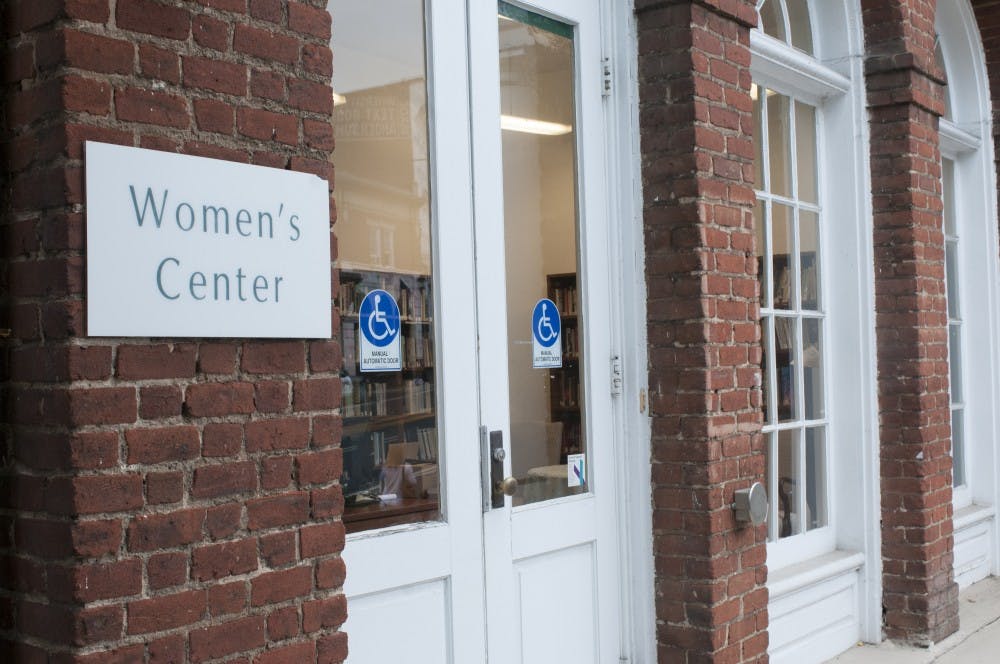The University Women’s Center commenced Domestic Violence Awareness and Prevention Month last Tuesday, inviting students to commit to non-violence by leaving handprints on a “These Hands Are Not for Hurting” banner and planting red flags on the lawn.
Students were also encouraged to wear red in honor of affected victims and contribute to a toiletry drive, to be donated to the Shelter for Help in Emergency, a local organization which serves victims of domestic violence.
In addition to raising awareness, the program also aims to promote understanding of prevention and intervention tactics of domestic violence and intimate partner violence, said Claire Kaplan, director of sexual and domestic violence services at the Women’s Center.
“I work with survivors of gender violence, and their friends and families,” Kaplan said. “I offer support, guidance, advocacy and a safe space to heal. We take a bystander intervention approach, and a sex-positive one, meaning that the goals are healthy, loving relationships and positive, consensual, fun sex, in addition to respect and equality in all ways.”
The center has also planned a survivor support network training workshop entitled “Becoming an Effective Ally for Survivors of Gender Violence” for later this month. The workshop aims to provide strategies for offering peers support if they have been affected by sexual assault or intimate partner violence.
“Intimate partner violence impacts everyone here,” Kaplan said. “Whether it’s through one’s own family, being a friend of a survivor or victim, or observing its impact from afar, we all pay the price.”
Kaplan also noted the prevalence of male abuse, often understated in the field of seuxal violence.
“Young women between the ages of 16 and 24 are at highest risk for being abused in a relationship, but men are also abused,” she said. “Abuse occurs in same-sex relationships as well — whether it involves gay men or lesbians. We must raise awareness so that students who are in abusive relationships will seek out help before it’s too late.”
Multiple contracted independent organizations around Grounds have joined in on the awareness effort — including One Less, a CIO focused on raising awareness and creating a dialogue regarding intimate partner violence both on Grounds and in the community at large.
Fourth-year College students Karina Carlson and Staige Davis, co-presidents of One Less said the issue of partner violence highlights the need for bystander intervention.
Particularly in presentations to University men, One Less recognizes that people often don’t know how or feel uncomfortable intervening.
“We know that by and large that these are not the men and these are not the people that are going to be committing sexual assault, but they should be standing up [against] it,” Carlson said.
Carlson and Davis say it is also important to note that most sexual assaults are committed by “non-strangers.”
“It’s actually kind of dangerous to tell this story of the rapist in the dark alley, who is a stranger and is going to leap out of the bushes, because it casts rape as something that happens in an alternate society,” Davis said. “The truth is that it happens in our community, by members of our community. It’s a scary thought, but if you can’t look that in the eye, you can’t really address the issue.”
Although the group One Less will not host any special events this month, they plan to work closely with the Women’s Center to promote the awareness effort
The all-male CIO One in Four will also help to promote the event. The organization aims to educate members of the University community about sexual assault, as well as creating effective bystanders.
“We speak to groups of men around U.Va. on issues of consent, bystander intervention, survivor recovery and how men can be allies in this fight to end sexual violence,” said Matt Menezes, graduate student and President of One in Four. “While this is not specific to domestic violence prevention, nor is it confined to this month, it is part of our continuing effort to raise awareness about the issue and empower men to be neither victims nor bystanders, but rather active allies.”







